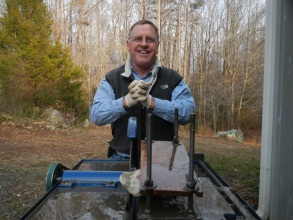
Senior Fellow in the Center for the Study of Aging
Member of Sarah W. Stedman Nutrition and Metabolism Center
Carmichael Building
james.bain@duke.edu
RESEARCH
During ten-plus years of development of our Stedman Metabolomics Laboratory, my colleagues and I have collaborated with hundreds of investigators, worldwide, while maintaining a strong focus on diabetes, obesity, cardiovascular disease, and other human conditions characterized by metabolic dysregulation (1,2,3,4,5,6,7,8,9). Our lab has developed quantitative, targeted metabolomic assays (1,10) covering such major groups of intermediary metabolites as amino acids, fatty acids, acyl coenzyme A’s, organic acids, and purines.
My current studies in the Duke Molecular Physiology Institute (DMPI) are dedicated to development and deployment of methods for exploratory, non-targeted metabolomics. My collaboration with Agilent Technologies, Inc., and Duke’s Michael J. Muehlbauer, Ph.D., has produced one of the world’s largest retention-time-locked spectral libraries of metabolites for use in gas chromatography/mass spectrometry.
I am especially interested in how metabolism impacts human health early (11, 12) and late (13) in life, and how the interplay among our gut microorganisms, our diet, and our endogenous human metabolism influences our health (14,15,16).
With William Lowe, M.D., Denise Scholtens, Ph.D., and their coworkers at Northwestern University, we are examining maternal and full-term neonatal metabolism in hundreds of families enrolled in the international Hyperglycemia and Adverse Pregnancy Outcomes (HAPO) trial. Preliminary data reveal that mothers with mildly elevated fasting plasma glucose (FPG) have metabolic perturbations spanning diverse biochemical pathways and suggest that depletion of 1,5-anhydroglucitol is a useful clinical marker of recent hyperglycemic excursions in high-FPG mothers (12).
Pilot studies of underweight, premature, critically ill neonates treated at Duke Children’s Hospital (DCH) show striking departures of metabolism from that seen in full-term babies. DMPI is embarking on an integrated study of metabolism, gut microbiota, and clinical outcomes in these vulnerable babies with Patricia Ashley, M.D., Ph.D., and her DCH colleagues.
Support from Duke’s Pepper Older Americans Independence Center enables us to provide metabolomic assays for investigators in gerontology and clinical geriatrics (13). We are currently gathering samples for studies of osteoporosis and fracture risk in elderly patients with diabetes and for an investigation of the perceived acceleration of aging seen in elderly HIV patients undergoing highly active antiretroviral therapy or HAART.
Our studies of the metabolic impacts of gut microbes with Jeffrey I. Gordon, M.D., and his team at Washington University, have been fruitful (14,15), and have recently raised the possibility that our gut microbiome can contribute to the onset of obesity and insulin resistance (16). We are partners with Dr. Gordon’s group and others in the Breast Milk, Gut Microbiome, and Immunity (BMMI) Project, funded by the Bill and Melinda Gates Foundation. BMMI seeks to develop functional foods in which milk products, paired with specific, milk-adapted microbes, can be used to prevent and treat malnutrition in children. Our initial metabolomic studies are looking at gnotobiotic mice colonized with gut microbes from Bangladeshi and Malawian children.
Working in close collaboration with Monte Willis, MD, PhD, MBA at UNC-CH, we have recently begun exploring the roles that the ubiquitin-ligase system plays in the etiology of heart disease. Our work is based on a number of innovative in-vitro and in-vivo models. (17,18,19,20,21,22,23,24)
PUBLICATIONS
LINKS
James Bain is a rock hound, and he especially likes fossils. Digging in the mud always makes him smile.
In this picture, he is sawing “deli slices” of petrified wood in his driveway.

In his barn, he keeps hundreds of pounds of Miocene gravel in five-gallon buckets, a generous gift of the PotashCorp phosphate mine and the Aurora Fossil Museum, both in Aurora, NC. This gravel contains lots of small shark teeth and other fossil “treasures.” JB and his friends use this gravel to put on free fossil digs at public events statewide.
JB encourages people to support these non-profit educational organizations in North Carolina:
- Aurora Fossil Museum, Aurora (http://www.aurorafossilmuseum.com/).
- Greensboro Science Center, Greensboro NC(http://colburnmuseum.wordpress.com/).
- Museum of Life and Science, Durham (http://lifeandscience.org/).
- North Carolina Fossil Club, Inc., Raleigh (http://www.ncfossilclub.org/).
- North Carolina Museum of Natural Sciences, Raleigh (http://naturalsciences.org/).
- Rankin Museum of American Heritage, Ellerbe (http://www.rankinmuseum.org/).
- Schiele Museum of Natural History, Gastonia (http://www.schielemuseum.org/).
